Choosing the right product is the most critical decision an Amazon seller makes. A great product can succeed even with average marketing, but the best marketing in the world can’t save a bad product with no demand. With over 350 million products on Amazon, guessing isn’t a strategy; it’s a quick path to lost capital and wasted time.
Successful sellers don’t guess. They use data to find gaps in the market, validate consumer demand, and accurately calculate potential profitability before investing a single dollar in inventory. This is where Amazon product research tools become essential. These platforms analyze millions of data points, uncovering sales trends, competitor weaknesses, and keyword opportunities that are impossible to spot manually.
This guide breaks down the top 12 tools for 2025, going beyond simple feature lists. For each tool, you’ll find a clear explanation of what it does best, who it’s for, and how to use its data to make smarter sourcing decisions. We’ll explore specific use cases with screenshots and direct links, helping you compare platforms like Jungle Scout, Helium 10, and even Amazon’s own Product Opportunity Explorer. To navigate the vast landscape of options, you might also find a comprehensive guide on Amazon product research tools helpful. Our goal is to give you the practical insights needed to find your next winning product with confidence.
1. Amazon Product Opportunity Explorer
The Amazon Product Opportunity Explorer is Amazon’s in-house tool, offering a rare look into first-party customer search and purchasing data. Unlike third-party tools that rely on estimations, this platform gives Professional sellers direct access to Amazon’s insights on emerging niches, customer demand, and product performance. It’s the closest you can get to understanding what shoppers are doing on the platform.
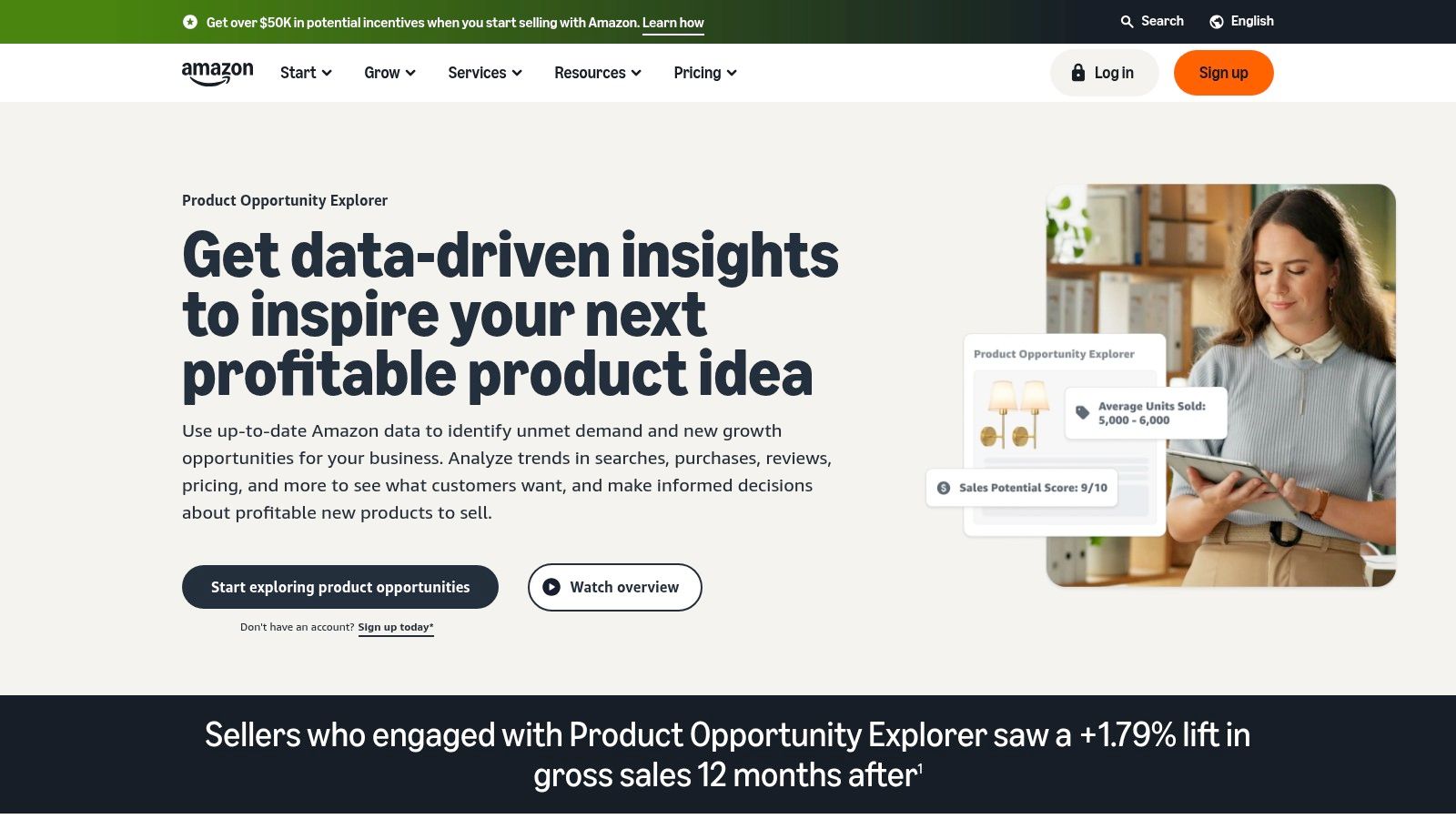
This tool is a powerful starting point for any seller wanting to validate a product idea with high-confidence data before investing. You can analyze search volume trends, average pricing, conversion rates, and even seasonality directly from the source. It also features a “Returns” tab that breaks down the primary reasons customers return products within a niche, giving you invaluable feedback for product development. The insights you gain here can help you identify high-demand, low-competition areas more effectively. For a deeper understanding of market dynamics, you can explore detailed guides on what products sell best on Amazon.
Key Features & Access
- Access: Included with a Professional Seller account, located under the “Growth” tab in Seller Central.
- Data Source: Uses 100% first-party Amazon data for superior accuracy.
- Niche Insights: Provides detailed metrics on search volume, unit sales, pricing trends, and review counts for specific customer niches.
- Return Drivers: Identifies common reasons for product returns, helping sellers improve quality.
Pros:
- Unmatched Data Accuracy: The data comes directly from Amazon, eliminating guesswork.
- No Additional Cost: It’s included with the standard Professional seller subscription fee.
Cons:
- Limited Access: Only available to sellers with a Professional account.
- Gradual Rollout: Features and data availability can vary by marketplace.
Website: Amazon Product Opportunity Explorer
2. Jungle Scout
Jungle Scout is a complete Amazon research suite for sellers at every level. It combines a powerful web app with a handy Chrome/Firefox extension, covering everything from initial product discovery to tracking competitor performance. It’s often considered a foundational Amazon product research tool, especially for private-label sellers building a brand from scratch.
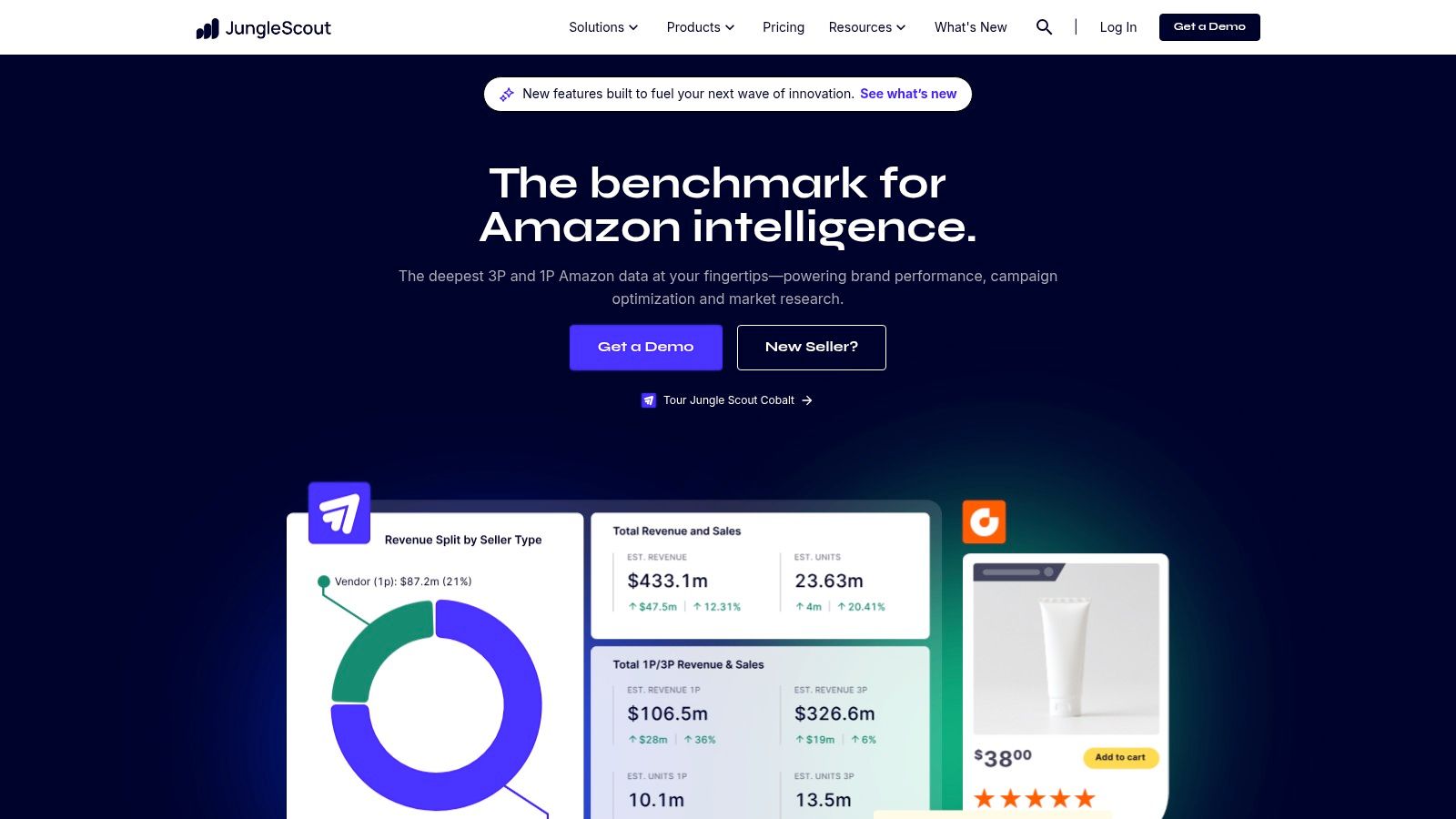
The platform simplifies finding a profitable product. Its Product Database lets you filter millions of Amazon products by category, sales, revenue, and other criteria, while the Opportunity Finder helps identify high-demand, low-competition niches. The browser extension overlays key data directly onto Amazon’s pages, allowing for quick analysis without switching tabs. For those looking to compare its capabilities, you can find a detailed breakdown in this guide to the best Amazon seller tools. Jungle Scout’s established dataset and intuitive workflows make it a reliable choice.
Key Features & Access
- Access: Subscription-based service with tiered plans. It offers a 7-day money-back guarantee instead of a free trial.
- Data Source: Relies on a proprietary algorithm that analyzes vast amounts of Amazon sales data to provide accurate estimations.
- Product Research Suite: Includes a Product Database, Opportunity Finder, and Product Tracker to monitor potential products.
- Keyword & Listing Tools: Features Keyword Scout for finding relevant search terms and a Listing Analyzer to score your product pages.
Pros:
- Well-Established Dataset: Trusted by many sellers for its long-standing data accuracy.
- Scalable Plans: Offers packages suitable for solo entrepreneurs up to large brands.
Cons:
- Tiered Feature Access: The most powerful features are reserved for higher-priced plans.
- No Free Trial: You must commit to a plan, though there is a money-back guarantee.
3. Helium 10
Helium 10 is one of the most complete Amazon seller suites available, offering a broad spectrum of tools that cover the entire selling journey. It’s particularly strong in the research phase, with modules like Black Box for product discovery and Cerebro for reverse-ASIN lookups. This all-in-one approach makes it a favorite for sellers who want a single platform to handle everything from product ideation to advertising.
Unlike tools that focus on just one aspect of selling, Helium 10 connects the dots. For instance, you can find a product idea with Black Box, validate its market with the Xray Chrome Extension, and find competitor keywords with Cerebro. This integrated workflow saves time and ensures data consistency. The platform also includes features for managing profits, getting listing alerts, and automating PPC campaigns, making it a scalable solution for growing brands.
Key Features & Access
- Access: Subscription-based with a free, limited plan and several paid tiers.
- Product Research: Black Box tool to filter millions of products, plus the Xray extension for on-page data.
- Keyword & Competitor Analysis: Cerebro for reverse-ASIN lookups and Magnet for extensive keyword discovery.
- Operational Tools: Includes listing optimization, inventory management, profit tracking, alerts, and PPC automation.
Pros:
- All-in-One Suite: A vast collection of tools that cover nearly every aspect of selling on Amazon.
- Scalable Solution: Caters to everyone from beginners to large brands.
Cons:
- Steep Learning Curve: The sheer number of tools can be overwhelming for new users.
- Tiered Feature Access: Usage is limited on lower tiers, with the best features on more expensive plans.
4. AMZScout
AMZScout is a popular Amazon product and keyword research toolkit for new and experienced sellers. It’s known for its AI-powered Chrome extension, which delivers on-page data estimates and quick validation directly in Amazon’s search results. This makes it a strong choice for sellers focused on private label, online arbitrage, and wholesale who need to make rapid, data-informed decisions.
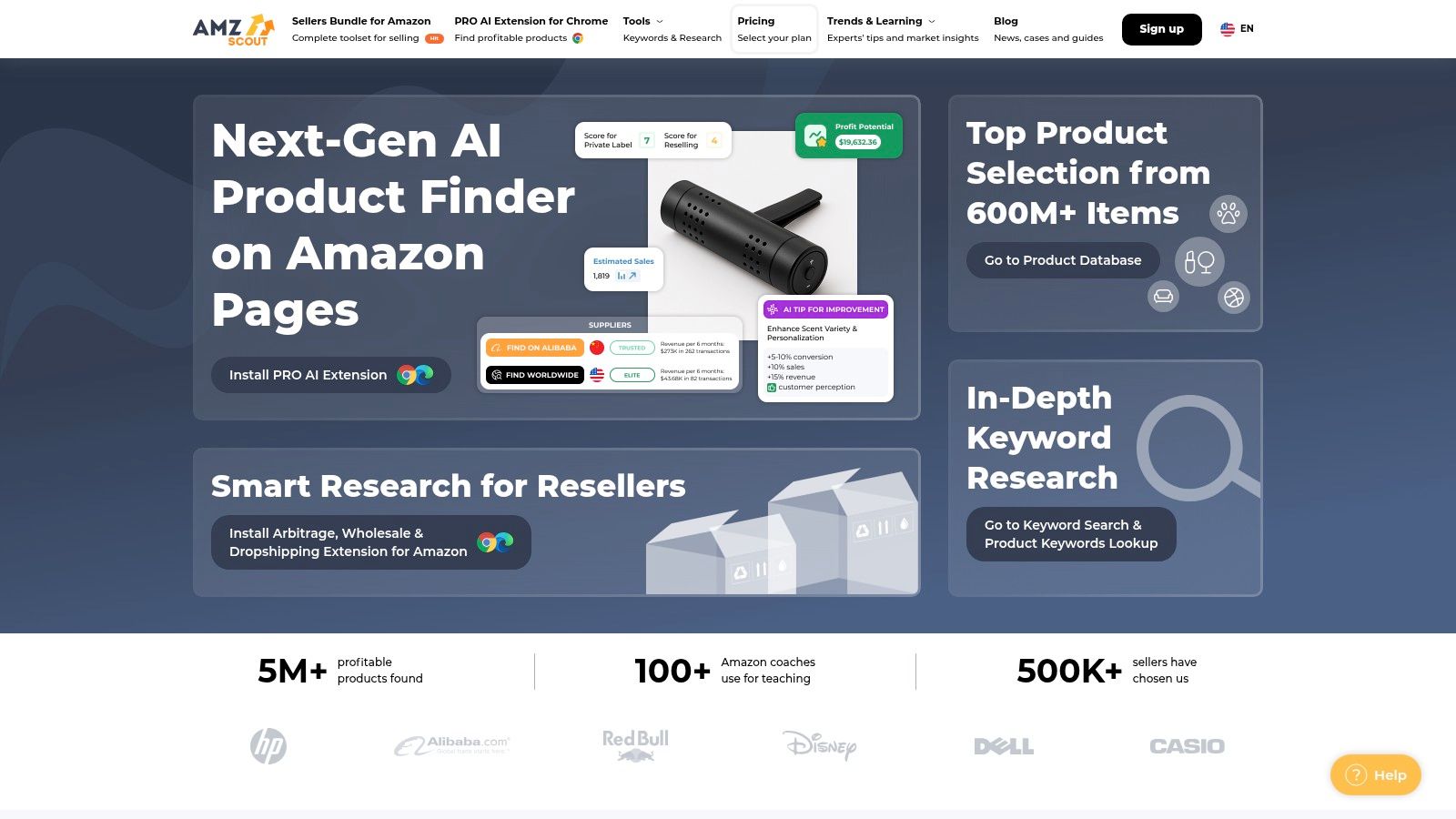
The platform bundles its core features, like the Product Database and Product Tracker, into easy-to-understand packages, often supported by training materials for beginners. This focus on user education helps demystify the process of finding profitable products. For sellers building their business from the ground up, AMZScout provides a solid foundation. You can get more insights on this topic by exploring guides on how to start an ecommerce business on Amazon. Its Quick View and Stock Stats features are also useful for assessing competitor inventory levels.
Key Features & Access
- Access: Available through tiered subscription plans, including monthly, annual, and lifetime options.
- PRO AI Extension: Offers on-page data estimates, including sales, revenue, and a niche score for quick validation.
- Product Database & Tracker: Allows users to filter Amazon’s entire catalog and monitor competitor performance.
- Keyword & Competitor Tools: Includes tools for keyword research and reverse ASIN lookups.
Pros:
- User-Friendly Packages: Clear offerings and frequent training are great for new sellers.
- Low-Risk Trial: Offers a short money-back guarantee for testing.
Cons:
- Tiered Feature Access: Not all features are available in the basic plans.
- Upfront Lifetime Cost: Lifetime plans require a significant initial investment.
5. Viral Launch
Viral Launch is a suite of tools that guides sellers from product discovery through launch and optimization. It’s well-regarded for its Market Intelligence feature, which provides sales estimates, price history, and review trends to help you evaluate a product’s viability. The platform combines these research capabilities with tools for keyword tracking, making it a solid all-in-one solution.
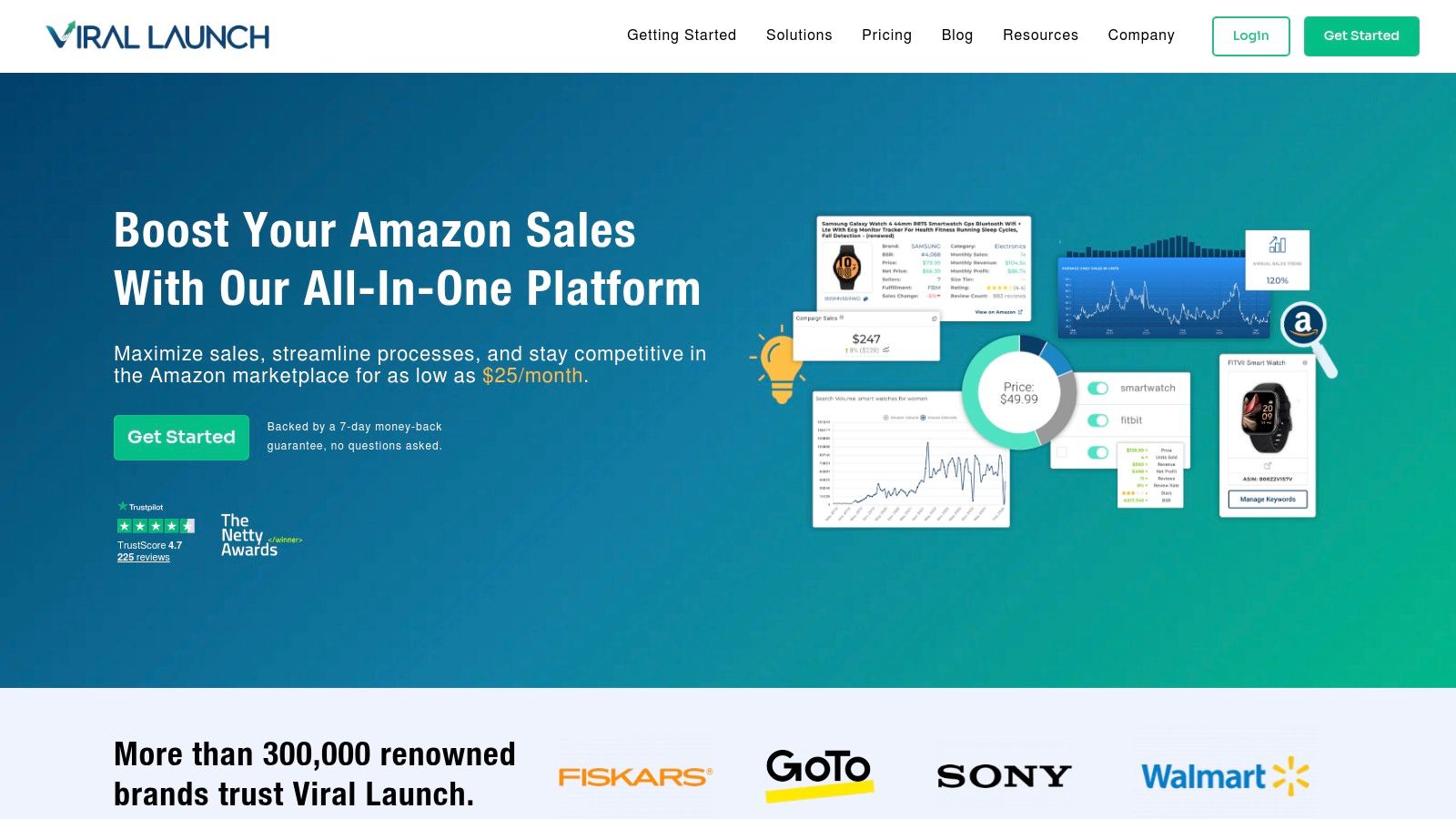
What sets Viral Launch apart is its focus on historical data, particularly for keywords and advertising performance. This insight is valuable for understanding seasonal trends and competitive ad strategies over time. Its Product Discovery tool includes an idea score and filters for competition, helping you find promising opportunities. For sellers ready to scale, the platform’s tools provide a clear roadmap. You can get more insights on how these tools support a new product release by reading this guide on an Amazon product launch.
Key Features & Access
- Access: Subscription-based with multiple tiers (Essentials, Pro, Pro Plus Ads, Scaler).
- Product Discovery: A robust tool with an idea score, seasonality metrics, and advanced competition filters.
- Market Intelligence: Offers sales estimates, price history, and review velocity for product analysis.
- Keyword Research & Tracking: Tools for finding keywords, tracking rank, and analyzing listings.
- PPC Automation: The AdSprout tool, on the Scaler tier, helps automate ad campaigns.
Pros:
- Strong Historical Data: Offers valuable historical keyword and ad rank data, especially in higher-tier plans.
- Money-Back Window: Provides a trial period, allowing new users to test the platform.
Cons:
- Tiered Feature Access: Key features like PPC automation are restricted to the most expensive plans.
- Entry Plan Limitations: The entry-level plans may feel limited for sellers needing advanced analytics.
6. SmartScout
SmartScout is an intelligence platform for sellers who want to look beyond individual products and analyze entire brands and categories. It’s effective for wholesale sourcing, online arbitrage, and private-label sellers looking for underserved niches. The tool excels at identifying high-potential brands by providing detailed traffic, revenue, and subcategory data, making it one of the best Amazon product research tools for B2B prospecting.
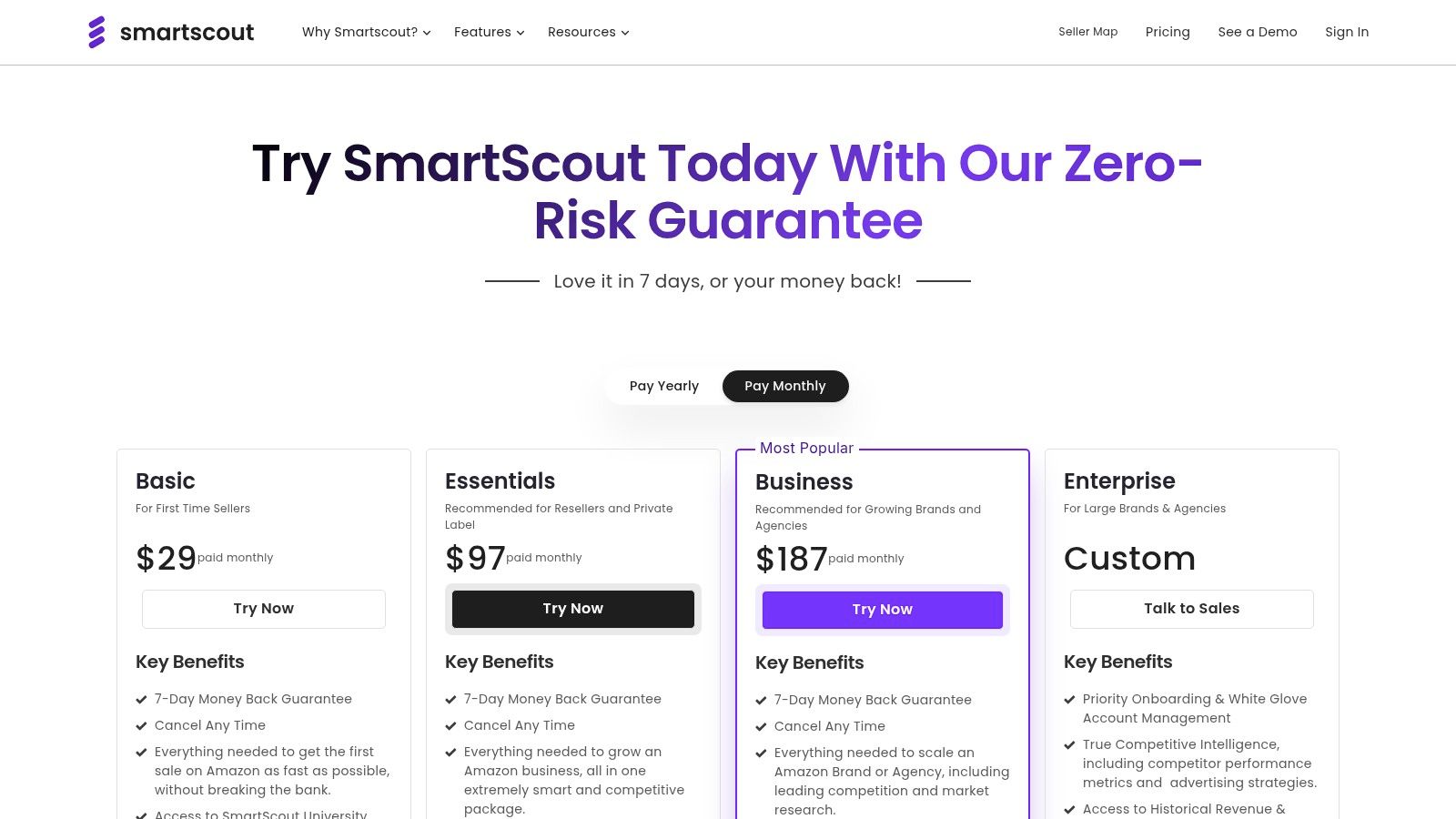
Unlike tools focused on single product validation, SmartScout provides a top-down view of the marketplace. You can filter brands by revenue, number of sellers, and even Amazon’s FBA presence to find wholesale opportunities. Its price list scanner is a standout feature for resellers, letting you upload a supplier’s spreadsheet to see which products are profitable. While its data-heavy interface might seem intimidating, the insights it offers for scaling through brand-level analysis are unmatched.
Key Features & Access
- Access: Subscription-based service with tiered plans (Basic, Essentials, Business).
- Brands & Products Databases: Search and filter millions of brands and products using advanced criteria.
- Price List Scanner: Quickly analyze supplier price lists to identify profitable products for resale.
- Profitability Calculator: An integrated tool to estimate fees, ROI, and net profit.
- Chrome Extension: Provides on-page data and analysis while browsing Amazon.
Pros:
- Excellent for Wholesale: Specifically built to identify and vet potential wholesale accounts.
- Affordable Entry Point: The Basic plan offers a cost-effective way to access core features.
- Multi-Seat Allowances: Even lower-tier plans include access for multiple users.
Cons:
- Steep Learning Curve: The data-dense interface can be challenging for beginners.
- Advanced Features Gated: Key features like the AI UPC Lookup are locked behind higher-priced tiers.
7. ZonGuru
ZonGuru is an all-in-one Amazon seller suite for data-driven product ideation, validation, and optimization. It stands out with strong international marketplace coverage, offering tools that support sellers across the US, EU, and Australia. The platform combines product research with listing optimization and business metrics, making it a complete solution for managing your workflow from a single dashboard.
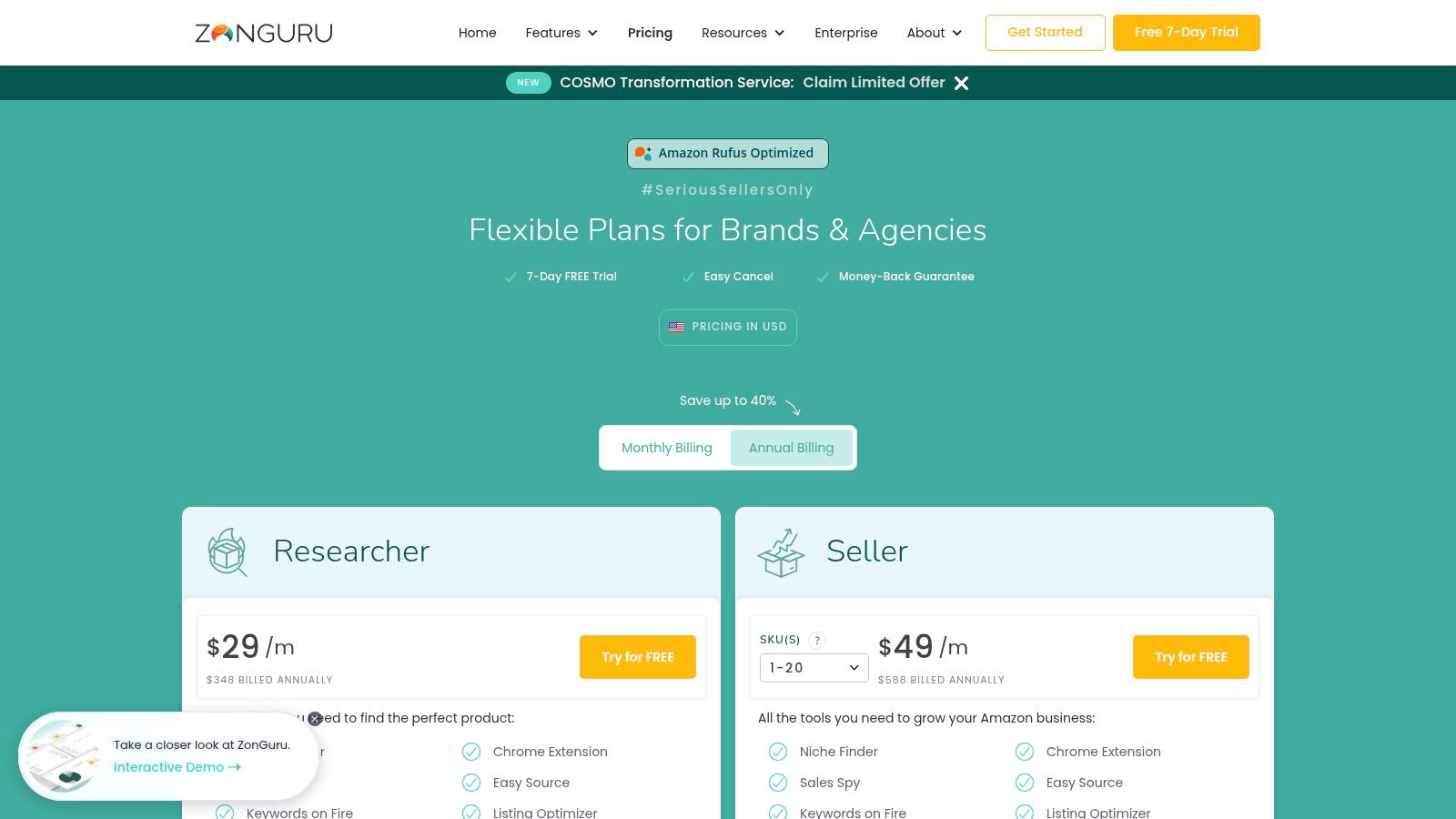
Its “Niche Finder” tool helps uncover profitable product ideas by analyzing demand, competition, and revenue potential. For keyword research, “Keywords on Fire” digs deep to find high-volume search terms to build powerful listings. What makes ZonGuru one of the more practical Amazon product research tools is its 24/7 customer support, staffed by actual Amazon sellers. This combination of robust tooling and experienced support makes it a strong choice for both new and established sellers.
Key Features & Access
- Access: Available through tiered subscription plans, with pricing often based on the number of SKUs managed.
- Niche Finder: A product ideation tool that helps identify untapped market opportunities.
- Keywords on Fire: An advanced keyword research tool for discovering relevant search terms.
- Broad Marketplace Support: Provides data and support for major marketplaces in North America, Europe, and Australia.
- Seller Central Integration: Connects to your seller account for sales tracking, profit monitoring, and performance alerts.
Pros:
- Excellent Customer Support: Offers 24/7 support from a team of experienced Amazon sellers.
- International Coverage: A great option for sellers expanding to multiple global marketplaces.
Cons:
- Cost Can Scale Quickly: Plans tied to SKU count can become expensive as your catalog grows.
- Separated Tools: Some advanced features may be sold as add-ons, increasing the overall cost.
8. MerchantWords
MerchantWords is one of the original Amazon keyword research platforms, specializing in shopper search data. Its strength lies in its massive historical keyword database, which tracks search trends and volume from the Amazon search bar across multiple global marketplaces. This makes it an invaluable asset for keyword-driven product ideation and optimizing listings for visibility.
Instead of focusing on product databases, MerchantWords helps you identify opportunities by analyzing what shoppers search for. You can use its Reverse-ASIN tool to see what keywords your competitors rank for, discover emerging trends, and build high-converting listings with its AI-assisted Power Listing feature. For sellers who believe understanding customer search intent is the foundation of success, this tool is a clear window into the market’s mind. To learn more, you can see how it stacks up as the best keyword research tool for Amazon.
Key Features & Access
- Access: Subscription-based with different tiers for single-market or global access. No free trial is available.
- Data Source: Collects keyword data directly from the Amazon search bar across 11 major marketplaces.
- Keyword Insights: Provides search volume estimates, historical trend data, seasonality, and related keywords.
- Competitive Analysis: Features like Reverse-ASIN and Digital Shelf allow you to analyze competitor keyword strategies.
Pros:
- Extensive Historical Data: Its large dataset is excellent for tracking long-term trends and seasonality.
- Global Marketplace Coverage: Offers simple pricing tiers for accessing data from North America, Europe, and Asia.
Cons:
- No Free Trial: You must commit to a paid plan to access the tools.
- Best Used with Other Tools: Primarily a keyword tool, so it’s most effective when paired with a product database tool.
9. SellerApp
SellerApp is an all-in-one Amazon platform that integrates product research, keyword optimization, profit analytics, and PPC automation. It connects the dots between finding a product, optimizing its listing, and managing its ad campaigns. This makes it useful for sellers who want a unified view of their entire business, from research to daily profitability, without juggling multiple subscriptions.
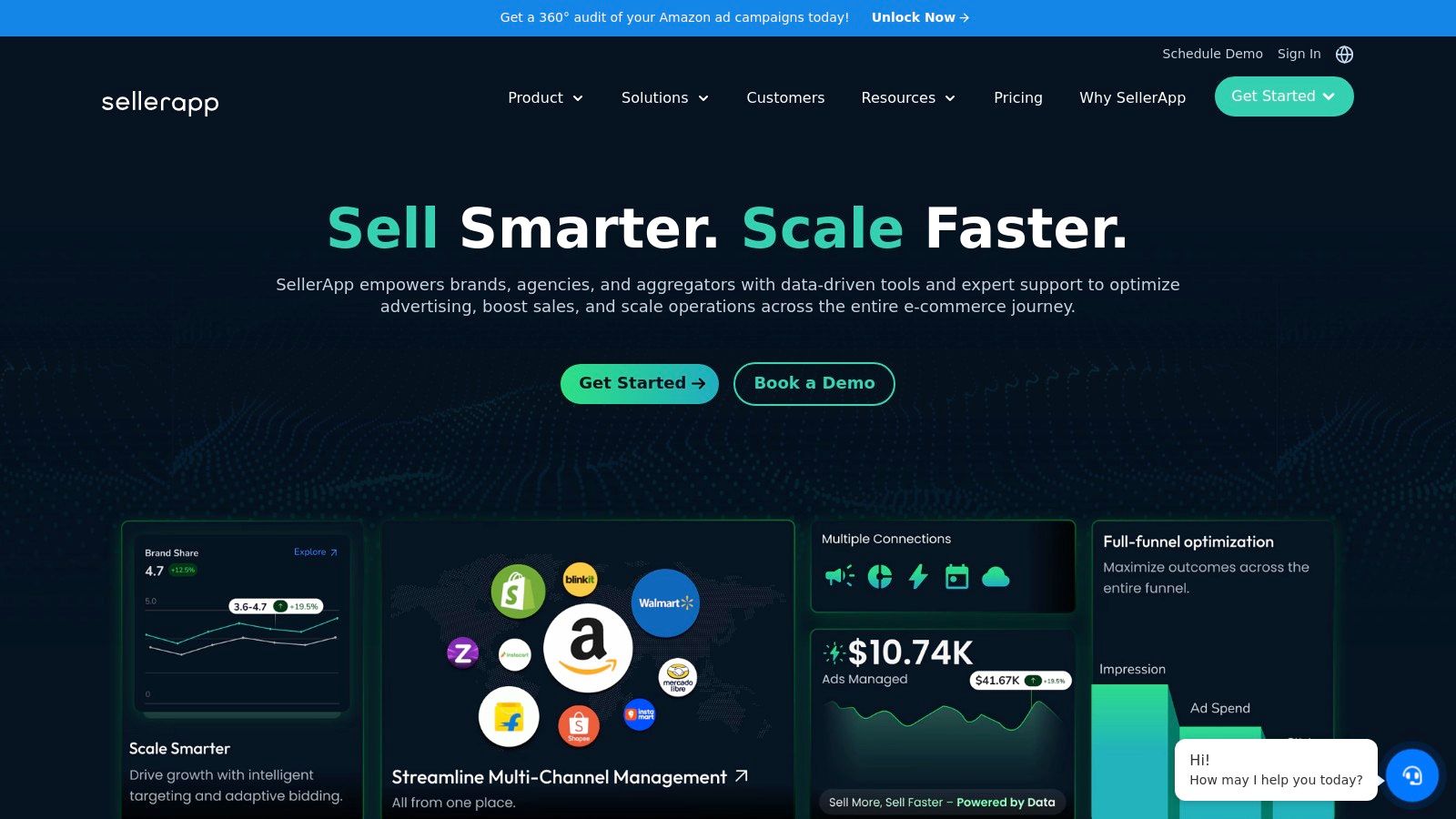
The platform’s Product Intelligence tool provides essential data like historical sales, pricing, and BSR to validate opportunities. Its real power, however, is the connection to its PPC Campaign Manager, which uses AI to automate bids and suggest keywords based on performance. The Listing Quality Index also gives sellers an actionable score to improve their product pages. This holistic approach bridges the gap between market analysis and effective advertising, making it a comprehensive option among Amazon product research tools.
Key Features & Access
- Access: Offers a freemium plan with basic features; paid Pro and Agency plans unlock advanced functionality.
- Product Intelligence: Tracks historical sales, pricing, and BSR for product validation.
- PPC Campaign Manager: Provides AI-driven automation and keyword harvesting for ad optimization.
- Profit Analytics: Connects all business metrics to give a clear view of real-time profitability.
- Listing Quality Score: Analyzes and scores listings against best practices.
Pros:
- Freemium Entry: Allows new sellers to access basic research tools without an initial investment.
- Integrated Ad Management: Combines research, profitability, and PPC tools in one interface.
Cons:
- Requires Paid Tier for Full Value: The most impactful features are behind the Pro plan paywall.
- Can Be Overwhelming: The broad range of features may have a steep learning curve.
10. SellerAmp SAS
SellerAmp SAS is a specialized tool designed for speed, making it a favorite for Amazon sellers focused on Online Arbitrage, Wholesale, and replenishment models. Its strength lies in rapid, on-the-fly deal analysis. It overlays critical data directly onto Amazon product pages, letting sellers evaluate a product’s viability in seconds without switching tabs.
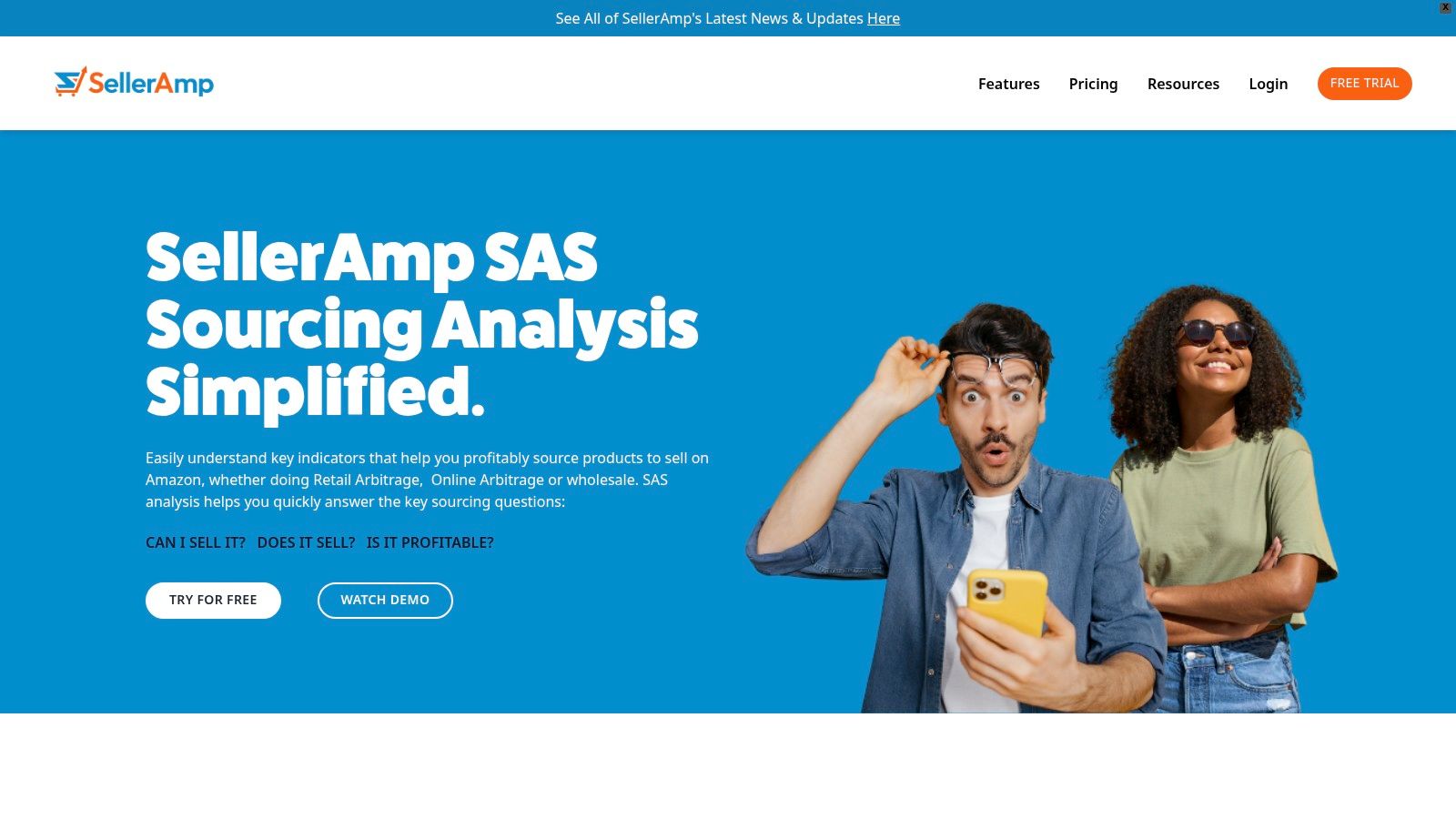
The platform consolidates everything needed for a quick sourcing decision: profit calculations, ROI, eligibility checks, IP alerts, and sales velocity. This makes it one of the most efficient Amazon product research tools for arbitrage sellers who analyze hundreds of products daily. Its browser extension, mobile app, and web app ensure you can source profitable deals from anywhere. The seamless integration with Keepa provides historical sales data right inside the SellerAmp interface, giving you confidence in a product’s long-term performance.
Key Features & Access
- Access: Available through affordable monthly or annual subscription plans (“Getting Started” and “Getting Serious”).
- Multi-Platform Tool: Includes a Chrome extension, a mobile app for retail arbitrage, and a web app.
- Instant Profit Calculator: Automatically calculates Amazon fees, potential profit, and ROI.
- Critical Alerts: Provides instant notifications for Hazmat status, IP warnings, and brand restrictions.
- Keepa Integration: Directly embeds Keepa charts within its interface for historical data.
Pros:
- Built for Speed: Designed for high-volume sourcing and rapid decision-making.
- Clear, Affordable Plans: Straightforward pricing makes it accessible for sellers at all levels.
Cons:
- Arbitrage-Focused: Less suited for comprehensive private-label product discovery.
- Relies on Keepa: To get the most value, a separate Keepa subscription is highly recommended.
11. Keepa
Keepa is a legendary price and sales rank tracker that’s become an indispensable tool for almost every serious Amazon seller. It provides detailed historical data charts directly on Amazon’s product pages through a browser extension. This allows sellers to instantly validate a product’s true price history, demand, and seasonality, avoiding temporary price drops that can lead to poor buying decisions.
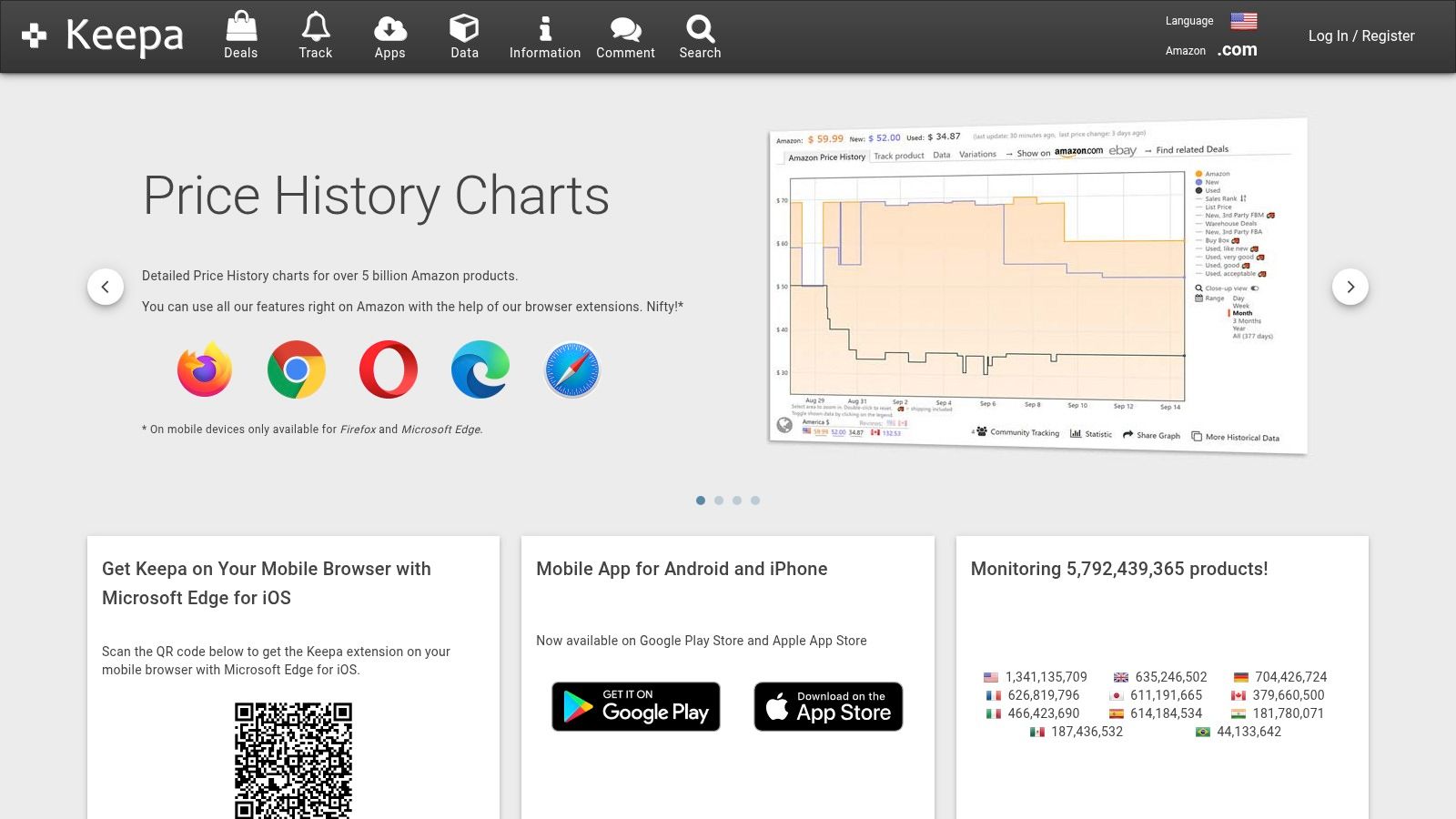
Among the many Amazon product research tools, Keepa’s strength lies in its historical data accuracy. By analyzing its graphs, you can spot how often a product goes on sale, whether its sales rank is consistent, and how many sellers are competing for the Buy Box. This insight is critical for retail arbitrage, wholesale sourcing, and even private label sellers wanting to understand the pricing stability of a niche. The ability to set price drop alerts makes it a powerful tool for sourcing inventory at the perfect moment.
Key Features & Access
- Access: A free version is available, but a premium subscription (priced in EUR) is required for sales rank history and other essential features.
- Data Source: Tracks historical data points for millions of Amazon products, including price, sales rank (BSR), and offer counts.
- Browser Integration: Integrates into Amazon product pages on popular browsers like Chrome and Firefox.
- Alerts & Tracking: Users can set up alerts for specific price points or when an item is back in stock.
Pros:
- Essential Price History Data: Provides the most reliable signal for understanding a product’s true market price and demand.
- Wide Integration: Integrates with many other popular sourcing and analysis tools.
Cons:
- Subscription Required for Full Value: The most critical data, like sales rank history, is behind a paywall.
- Technical Interface: The data-heavy charts can feel overwhelming for beginners.
12. CamelCamelCamel
CamelCamelCamel is a free Amazon price-tracking website and an essential, lightweight tool for any seller’s toolkit. It specializes in one thing: providing historical pricing data for millions of products. While not a comprehensive research suite, its value lies in its simplicity. Sellers can quickly validate a product’s price stability, identify seasonal pricing trends, and determine if a current “deal” is genuinely a good price.

The platform operates through its website and a handy browser extension called the “Camelizer.” When you’re on an Amazon product page, a single click on the extension reveals a detailed price history chart. This immediate access to historical context helps you make smarter purchasing decisions, whether you’re sourcing for retail arbitrage or analyzing a competitor’s pricing strategy. It’s one of the most straightforward yet effective Amazon product research tools for price validation.
Key Features & Access
- Access: Completely free to use via the website or browser extension.
- Historical Price Charts: Displays comprehensive pricing history for products sold on Amazon.
- Price Drop Alerts: Allows users to set a desired price and receive an email alert when it hits that target.
- Camelizer Browser Extension: Provides one-click access to price history directly on Amazon product pages.
Pros:
- Completely Free: No subscription fees or hidden costs to access all features.
- Quick Price Validation: Instantly shows if a product’s price is historically high, low, or average.
Cons:
- Pricing Focus Only: Lacks keyword data, sales estimates, or other in-depth analytics.
- Occasional Glitches: Some users report occasional quirks or downtime.
Top 12 Amazon Product Research Tools Comparison
| Tool | Key features | Strengths / USP | Best for | Limitations | Pricing / Access |
|---|---|---|---|---|---|
| Amazon Product Opportunity Explorer | First‑party search volume, conversion, pricing, review & returns data | Accurate Amazon‑native signals; no third‑party estimates | Professional sellers doing product discovery | Tied to Seller Central Pro; rollout varies by marketplace | Included with Professional Seller account; no extra fee |
| Jungle Scout | Product DB, Opportunity Finder, Keyword Scout, Tracker, browser extension, API | Mature dataset; proven private‑label workflows; scalable plans | Private‑label sellers and growing brands | Advanced features on higher tiers; no free trial (7‑day MBG) | Subscription tiers; higher plans costlier; 7‑day money‑back |
| Helium 10 | Black Box, Cerebro (reverse‑ASIN), Magnet (keywords), listing, alerts, inventory, ads | Comprehensive end‑to‑end suite; deep keyword & competitor data | Sellers wanting full workflow from ideation to advertising | Steep learning curve; limits on lower tiers; advanced tools behind paywall | Tiered subscriptions; ads automation on higher plans |
| AMZScout | AI Chrome extension, product DB, trackers, keyword tools, stock stats | AI on‑page estimates; clear bundles and training for newbies | Private‑label and arbitrage sellers validating listings | Features vary by bundle; lifetime options require upfront cost | Bundled plans or lifetime purchase; short money‑back window |
| Viral Launch | Product Discovery, Market Intelligence (sales estimates), keyword tools, PPC automation (AdSprout) | Strong historical keyword & ad‑rank data; launch-focused features | Brands needing historical analytics and product launches | PPC automation only on Scaler tier; limits on entry plans | Tiered subscriptions; money‑back testing window |
| SmartScout | Brands & product DBs, Chrome extension, price‑list scanner, profitability calc | Affordable entry; built for wholesale account & product scouting; multi‑seat | Wholesale and online‑arbitrage teams | Data‑dense interface; advanced ops on higher tiers | Basic affordable plans; multi‑seat options; tiered pricing |
| ZonGuru | Niche Finder, Keywords on Fire, Sales Spy, rank tracking, Seller Central integration | Seller‑staffed 24/7 support; broad marketplace coverage (US/EU/AU) | Sellers across regions needing support and integrations | SKU‑based pricing can grow costly; feature limits per plan | SKU‑based tiers; some tools sold separately |
| MerchantWords | Keyword volumes & trends, Reverse‑ASIN, Emerging Trends, AI Power Listing | Large historical shopper search dataset; simple tiering | SEO‑focused sellers and keyword ideation | No free trial; API is separate & higher cost; needs product DB to complete workflow | Subscription tiers; API available as add-on |
| SellerApp | Product intelligence, AI campaign manager, Listing Quality Index, profit analytics | Freemium entry; integrates ads, research and profitability in one UI | Sellers wanting unified ads management + research | Pro tier required for advanced features; broad UI can overwhelm new users | Freemium basic plan; paid Pro subscription for full features |
| SellerAmp SAS | In‑page ROI/margin, Hazmat/IP alerts, sales estimates, Keepa integration | Very fast decisioning for arbitrage workflows; clear pricing | Online / wholesale arbitrage and replenishment scouts | Focused on arbitrage, not deep private‑label ideation; Keepa recommended | Affordable subscription plans; Keepa subscription often recommended |
| Keepa | Price & BSR history charts on Amazon pages, alerts, Product Finder, apps | Essential true price history & seasonality signal; widely integrated | Sellers validating pricing trends and seasonality | Premium needed for full API/features; UI can be technical | Free basic use; premium subscription required for full features (EUR pricing) |
| CamelCamelCamel | Historical price charts, email price‑drop alerts, Camelizer browser extension | Free, lightweight and quick for price validation | Casual researchers and budget‑conscious sellers | Only pricing data (no keywords or sales analytics); occasional quirks | Free to use |
Turn Data into Decisions
The tools we’ve explored, from comprehensive suites like Helium 10 to specialized trackers like Keepa, all share a common purpose: they replace guesswork with data. Having access to this information is the first step, but the real advantage comes from turning that data into strategic, profitable decisions. An endless spreadsheet of keyword volumes and sales estimates is useless without a clear framework for analysis. Successful Amazon sellers don’t just find data; they interpret it to find a unique angle in the market.
This means moving beyond surface-level metrics. Instead of just seeing a product’s high revenue, a skilled seller uses these tools to uncover the why. Is the revenue driven by a few dominant players with massive ad budgets, or is there room for a new competitor? Is the demand seasonal, or is it a steady, year-round opportunity? The best Amazon product research tools provide the clues, but your analysis builds the case for launching a product.
From Analysis to Action
You’ve seen what each tool offers, its strengths, and its ideal user. Now, it’s time to choose a path forward. Your decision shouldn’t be based on which tool has the most features, but on which one aligns with your specific business model and current stage of growth.
- For the New Private Label Seller: Start with a tool that offers a strong product discovery and validation workflow. Jungle Scout or Helium 10 are industry standards for a reason. Focus on mastering their Opportunity Finder or Black Box features to identify niches with high demand and low competition. Your goal is to find a defensible product, not just a popular one.
- For the Established Brand or Agency: Your needs are more complex. You’re likely managing multiple ASINs and tracking competitors. A tool like SmartScout is excellent for brand-level analysis and identifying wholesale opportunities. For deep PPC and keyword insights, SellerApp provides a more granular view. Consider how these tools integrate into your existing workflow.
- For the Arbitrage or Wholesale Seller: Speed and accuracy are everything. Your focus should be on tools that provide instant, on-page data. SellerAmp SAS and ZonGuru are built for this. Their Chrome extensions let you analyze profitability, eligibility, and competition in seconds, which is critical when you’re making quick sourcing decisions.
A Final Thought
Remember, no tool is a magic button. The data is only as good as the strategy you build around it. Once you’ve chosen a tool, commit to learning its core functions. Watch tutorials, join user communities, and test its features on products you already know well. Use it to build a repeatable research process that you can trust.
While these Amazon-specific tools are crucial, a broader understanding of the competitive landscape can refine your business strategy. For those looking to expand their analytical capabilities, exploring the top market intelligence tools can offer a more complete view of consumer trends and industry shifts.
Ultimately, your journey on Amazon is a marathon, not a sprint. The right data gives you a map, showing you the clearest path forward and helping you avoid costly detours. By investing in the right research tool and developing the skills to interpret its insights, you’re not just finding a product to sell. You’re building a foundation for a sustainable e-commerce business.





